Content
The Primavera peony is a popular flower grown by many gardeners. This is due to its good adaptive abilities and unpretentious care. When blooming, such a peony will certainly become a beautiful decoration in a flower bed or a house plot. With strict adherence to the instructions, even inexperienced growers can grow such a plant.
Description of herbaceous peony Primavera
It is a perennial plant that was bred by breeders in 1907 in France. The flower has gained popularity among gardeners all over the world in a short period of time.
Representatives of the Primavera variety reach a height of 90 cm. The plant has a thick and strong stem with one, rarely several inflorescences. The shoot is covered with numerous green lanceolate leaves. Although the stem is sturdy, the plant needs a garter when growing to give the bush a neat look.
Peonies are among the light-loving flowers. However, the Primavera variety can also be grown in shaded areas. It is enough that a little sunlight falls on the plant during the day.
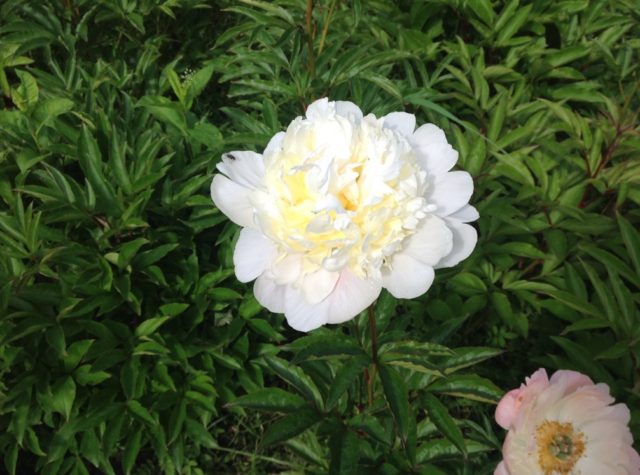
Despite the strong stems of the peony, it needs to be tied up
The peculiarity of the Primavera variety is its resistance to unfavorable conditions. It has good frost resistance, so they can be grown in any region, especially with a warm or temperate climate. Equally important is the fact that Primavera is distinguished by its resistance to diseases common among other ornamental plants.
Flowering features
On healthy bushes, several stems grow. On each of them, single or, in rare cases, numerous inflorescences appear. They are large in size and reach 20 cm in diameter.
Flowers of an anemone type. The lower petals are wide, growing in 1-2 rows. Those higher up have a narrow, short, rounded shape. This is due to the fact that the Primavera variety was obtained by crossing a terry peony and a Japanese peony.
The color of the flowers is peculiar. In the middle, the petals are yellowish, and those that surround them are white or pinkish. The splendor of flowering depends on the age of the bush. Usually, the largest buds grow on peonies from five years old. Plants grown in soil for less than 2 years do not bloom.
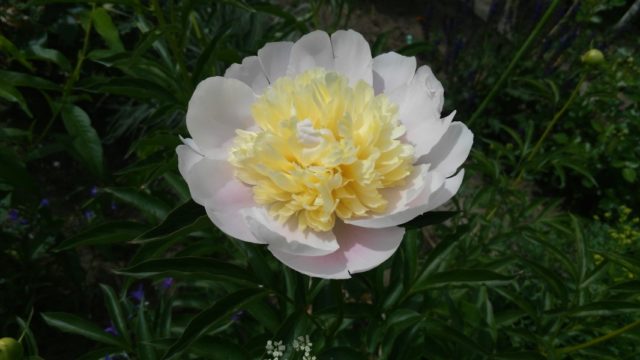
The buds are pale cream or pale pink in color
The flowering of the milky-flowered peony Primavera occurs mainly in late spring. If the warming came late, then the date may shift to the beginning of summer. The flowering period usually does not exceed 3 weeks.
Application in design
Primavera peonies are often used for decorative purposes. With their help, flower beds, borders and flower arrangements are created. Due to its high growth, the Primavera variety is used to create hedges. But most often they are used as a central decoration, planting other ornamental plants around them.
The flower arrangement with Primavera peonies will be well complemented by:
- white and yellow roses;
- lilies;
- phlox;
- chrysanthemums;
- asters;
- zinnias;
- petunias;
- nasturtium.
It is not recommended to grow the plant next to flowers from the Buttercup family. They quickly deplete the soil, and their roots release enzymes that negatively affect other plants.
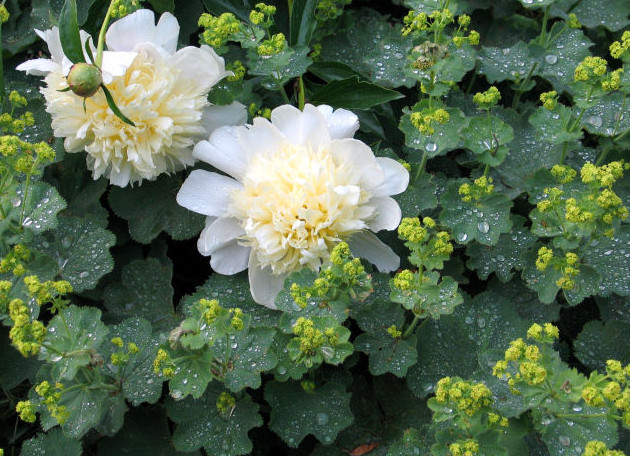
You can decorate any flower bed and summer cottage with peonies
When drawing up flower arrangements, it should be remembered that peonies always occupy a dominant position. In addition, these are perennial shrubs that love moisture and need a lot of space.
Reproduction methods
The main way is to divide the bush. This option is suitable for specimens that have reached the age of 6-7 years. Choose a shrub with multiple stems. It is dug up, the rhizome is divided, after which each sprout is planted in a new, previously prepared place.
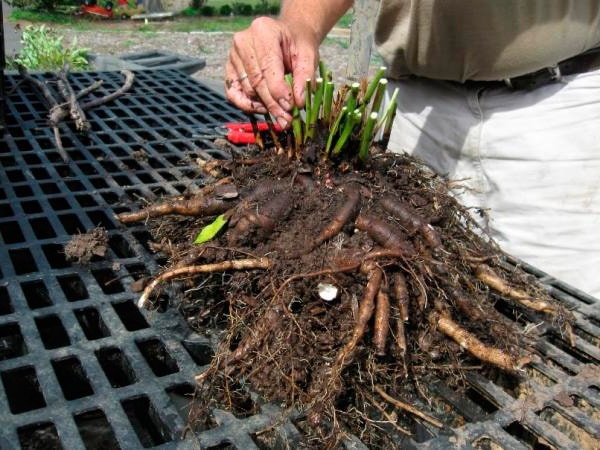
You can propagate the bush by dividing, carefully dividing the tubers
Another breeding option is layering. To do this, choose a bush with several stems and spud them with a layer of fertile soil. The layer should be 25-30 cm high. In the summer after flowering, the earthed stems form root layers. Then they are cut and planted in fresh soil.
Landing rules
For Primavera peonies, you need to choose the right site. Well-lit areas, sheltered from strong winds, are best. Then the plant forms roots and develops faster.
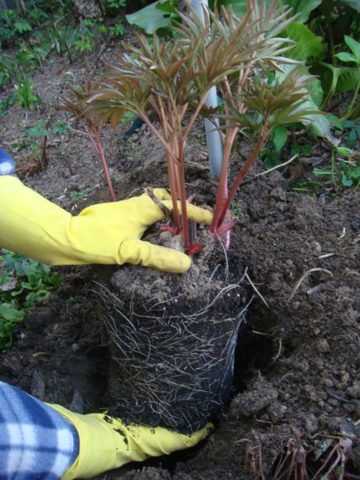
It is better to plant a peony in autumn or in spring before bud break
Spring planting is not recommended. This is due to the fact that at this time of the year, the peony begins to form a shoot faster than the root system. Because of this, he becomes fragile and sensitive. The bush weakens and does not bloom in the future.
The key to success in growing peonies is a competent planting. Having chosen a place, it is necessary to prepare the soil. After that, you can send the seedling to the ground.
Landing Algorithm:
- For each bush, dig a hole, 50-60 cm deep and wide.
- Lay a drainage layer of gravel, expanded clay or crushed stone at the bottom.
- Mix garden soil, half a bucket of humus, add 100 g of superphosphate.
- Fill the hole with the resulting mixture, cover with a layer of mulch.
- Leave on for 4-5 days.
- Dig a shallow hole, place a seedling, bury.
- The height of the soil layer above the tubers is no more than 6 cm.
When planting, the seedlings need to be watered with a small amount of soft, settled water. In doing so, make sure that the liquid is well absorbed and does not stagnate.
Follow-up care
Representatives of the Primavera variety are considered unpretentious. However, in the first year after planting in open ground, they need careful care. Young bushes are recommended to be tied up, as they can be damaged even by weak winds.
Also, care includes:
- Regular watering - 10 liters of settled water for each bush.
- Loosening of the topsoil - once every 2-3 weeks to enrich the soil with oxygen.
- Systematic removal of weeds.
- Replenishment of the soil with complex fertilizers - every month before wintering.
In the spring, after the snow melts, fertilizing with nitrogen-potassium fertilizers is carried out. Each bush requires 15-20 g of solution. The second feeding is after 2 months. Compositions with phosphorus and potassium are used. A similar procedure is repeated 2 weeks after flowering, when buds are laid.
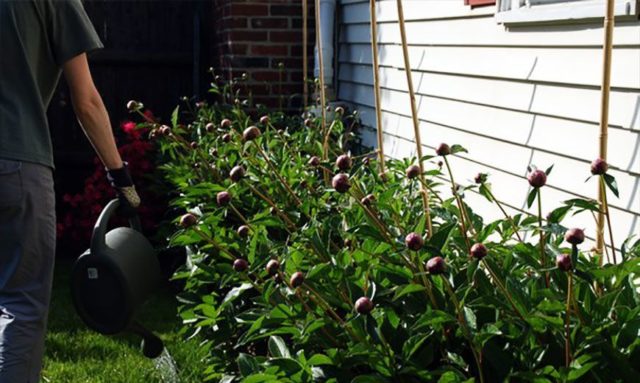
It is better to plant the plant in loamy soil, in which there is no stagnation of water
Adult bushes need to be watered once every 10 days. Each plant will require 20 liters of water. Loosening of the soil is carried out once a month. Peat, straw or dry compost are used for mulching.
General principles of caring for different varieties of peonies:
Preparing for winter
A few weeks after the end of flowering, dried leaves must be removed from the bush. The remaining stems continue to leave until October. When they turn whitish and lose their freshness, they are also cut off.
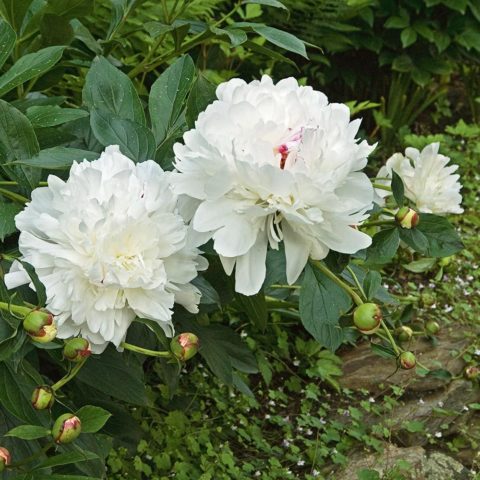
Despite the frost resistance, the plant in the cold season should be covered with sawdust or spruce branches.
To strengthen the plant before wintering, you need to make additional top dressing of the soil. For this, superphosphate is used. For 1 bush take 8 liters of warm water and 1 spoonful of fertilizer. First, the flower is watered with ordinary liquid, then the solution is injected.
Mature plants do not need shelter. They tolerate severe frosts well. Peonies up to 2 years old should be covered with sawdust mixed with peat after pruning.
Pests and diseases
When growing Primavera peonies, growers may face certain difficulties. Despite the unpretentiousness and resistance to adverse conditions, such a plant can get sick. This is usually caused by a violation of the landing and grooming rules.
The most common problem is root rot. It appears due to excessive soil moisture. This happens due to an incorrect irrigation regime or due to stagnation of the liquid. In such cases, it is necessary to carry out regular loosening of the soil in order to improve the outflow of water.
Due to improper care, Primavera peonies may develop fungal diseases:
- powdery mildew;
- gray rot;
- late blight;
- fusarium.
To treat such diseases, you need to remove the damaged parts of the plant. Fungicides are also used that inhibit pathogenic microorganisms.
Aphids, thrips and bronze beetles are widespread among the pests of Primavera peonies. During the treatment, peonies during the growing season should be sprayed with Karbofos solution.
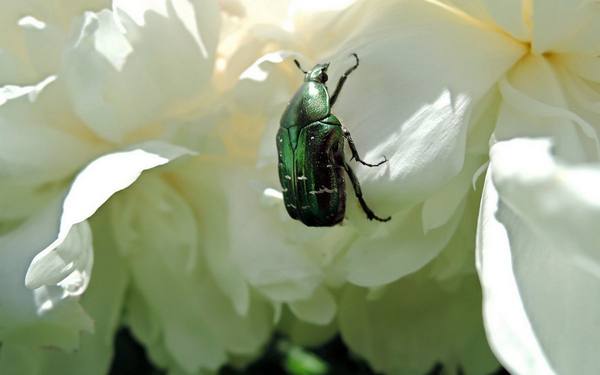
Bronze beetles can be manually removed from flowers
Flower rhizomes can infect nematodes. This is rare and is usually caused by other plants nearby. In case of defeat, the bush will have to be removed so that the worms do not spread to neighboring specimens.
Conclusion
Peony Primavera is intended for growing in open areas. The flower is unpretentious in care, therefore it is popular among gardeners. Subject to the basic rules of planting, watering and feeding, the peony will live up to 20 years. Due to the regular and abundant flowering, "Primavera" will become an excellent decoration for a flower bed or a summer cottage.








